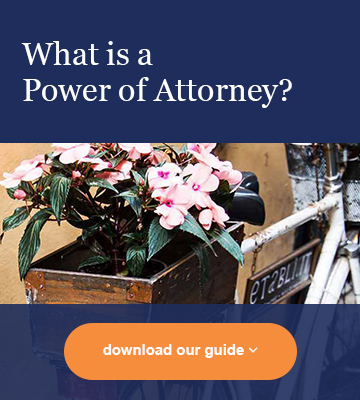
What is a Power of Attorney?
A Power of Attorney is a document that operates during your lifetime, giving other people the power to act and make decisions on your behalf when you are unavailable or unable to do so yourself.
The person who makes this document is referred to as a “Principal”. The person who has been appointed to make decisions on your behalf is referred to as an “Attorney”.
A Power of Attorney is a completely separate document from your Will (which only commences to operate upon your death).
Should I make a General Power of Attorney or an Enduring Power of Attorney?
A General Power of Attorney is most appropriately used when you are unavailable and you need someone to act on your behalf for a specific purpose: for example, if you are going away overseas at a time when your house is being sold, you can execute a General Power of Attorney appointing an Attorney to sign documents in relation to your sale transaction.
A General Power of Attorney can only be used for financial matters and while you are still capable of making your own decisions. A General Power of Attorney will cease to operate if and when you lose capacity.
An Enduring Power of Attorney is a document that will continue to operate (even after you have lost capacity) until it has been revoked. An Enduring Power of Attorney also allows you to appoint Attorney/s for 2 types of powers:
- General personal/health powers (for example, decisions about where you will live and the provision of any necessary care services for you). Your Attorney’s power will only commence when you yourself no longer have the capacity to make decisions in relation to these kinds of matters.
- Financial matters (for example, withdrawing or depositing money into your bank account and paying your bills). For these kinds of matters, you can decide when an Attorney’s power begins:
- Immediately;
- On a certain date; or
- When you no longer have the capacity to make decisions in relation to financial matters.
An Enduring Power of Attorney provides your Attorney/s with power to make decisions in relation to a broad range of matters. You may decide to restrict your Attorney’s power: for example, you may state that you do not want your Attorney/s to make any decisions in relation your Superannuation.
How will my Attorney know if I have lost capacity?
A person has lost capacity to make a decision if they can no longer:
- understand the nature and effect of a decision;
- freely and voluntarily make a decision; and
- communicate the decision in some way.
A General or Specialist medical practitioner usually determines whether someone has lost capacity.
Who should I appoint as my Attorney?
You should appoint someone that you can trust to manage your personal and financial affairs. For example, you may wish to appoint family members (such as your spouse and/or adult children) or a close friend.
An Attorney must be at least eighteen (18) years of age and must not be bankrupt or a paid health carer.
You should consider appointing more than one (1) Attorney in case your first named Attorney can no longer act (for example, if they die or lose capacity). If you appoint more than one (1) Attorney, you can decide how they are to act. For example, you may decide that your Attorneys are to act jointly, severally, as a majority or successively.
When will an Enduring Power of Attorney be revoked?
An Enduring Power of Attorney will come to an end if:
- You die;
- You get married or enter into a civil partnership (to the extent that the power is given to someone other than your husband, wife or partner);
- You get divorced or end a civil partnership (to the extent that the power is given to your divorced spouse or ex-partner);
- All of your Attorneys lose capacity or die; or
- You make a new Power of Attorney that is inconsistent with your current document.
When is the best time to make an Enduring Power of Attorney?
An Enduring Power of Attorney is a very powerful document. You are potentially giving another person total control over your assets and the ability to make personal decisions about your healthcare and living arrangements (when you no longer have the capacity to make these decisions yourself). For this reason, you should consider making an Enduring Power of Attorney while you are still capable and able to make your own informed decisions.

